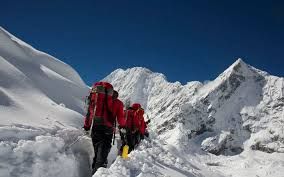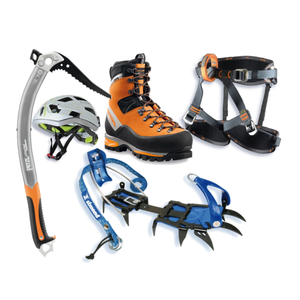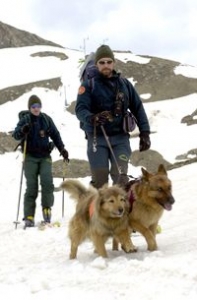Mountain in winter and summer remain a popular destination for recreational and sport activities. However, some basic precautions must be taken to prevent accidents.
Advice on how to move in the mountains safely
A high percentage of accidents that occur in the mountain happen due to human error that can nearly always be avoided The main reasons for accidents are: lack of knowledge of the environment; changing weather conditions; inexperience; and, an over estimation of personal ability.
There are certain causes that are unpredictable such as bad weather, avalanches, etc, which are unavoidable although their effect may be mitigated by means of precaution.
Advice on how to avoid accidents or mitigate them
-
Know the terrain and, if possible, be accompanied by experts.
-
To avoid danger, visit the mountain in a group – do not go alone.

-
Make sure you know survival techniques and how to move on the mountain. These can be learned from courses and guided outings organised by mountaineering clubs and groups.
-
Make sure you have adequate equipment and enough of it for your chosen activity: There is always minimum equipment that should be taken regardless the weather conditions (a change of underwear, warm clothes, sunglasses, cap, waterproof, water bottle, compass and maps or GPS).
-
Appropriate physical training: The effort of making an ascent does not finish at the peak because sometimes the descent can be as demanding as the ascent. You should reserve your energy to save strength for the return journey. Never be in a hurry in the mountain. If required, admit defeat. Choose a reasonable action. Do not attempt activities for which you are not prepared. Advice family members or the authorities of your itinerary or routes and times you intend to adhere to.
-
Check the most local and recent weather forecast available: Pay attention to sign posts, especially warning signs, and take heed of the precautions indicated in every case.
-
Take some means of effective communication: a mobile phone with the telephone numbers of the closet Civil Guard posts in
 the directory of the phone or the number 062 for the Operations centres of the Civil Guard. Many mountain ranges have a transmitter with a frequency (146,175 MHz) which is the emergency frequency of the Civil Protection Agency.
the directory of the phone or the number 062 for the Operations centres of the Civil Guard. Many mountain ranges have a transmitter with a frequency (146,175 MHz) which is the emergency frequency of the Civil Protection Agency. -
Make sure that you have basic first aid knowledge.
Practical advice for Gorge Walkers
First of all know the latest weather forecast. A storm at the base of a gorge while you are inside can produce flash flooding which can carry you away or block your descent.
-
Obtain information about the gorge you are going to descend before setting off (times, difficulty, dangers, height difference, required material) and if there are required techniques that you need to know.
-
Identify the escape routes from the gorge in case you have to escape due to bad weather or any other circumstance.
-
Some gorges have water courses which flow from dams which may be opened at certain times. You should make yourself aware of this eventuality and the times that any dams are opened up.
-
Never enter a gorge alone. The same as in the mountain the minimum number in a party should be three. Especially if you do not have mobile phone coverage which is common place in this type of setting.
-
Use wet suits even in summer and with hot weather carry the top piece with long sleeves in your rucksack.
-
Go equipped with a helmet, appropriate footwear, harness and rope, descenders, carabiners, whistle and a knife.

-
The rope which you use to enter the gorge should be double the length of the height of the greatest descent. You should also carry a spare rope.
-
You should check all fixing points from where you are going to rappel and you should carry a riveting hammer, spits, plates, cords and webbing, and check that they are adequate.
-
You should not jump into pools without first checking they are free from obstacles and dangerous currents. From one season to the next, pools that were clear of obstacles may have accumulated stones.
-
You should establish a signalling code between members of the group to communicate above the noise of the running water.



